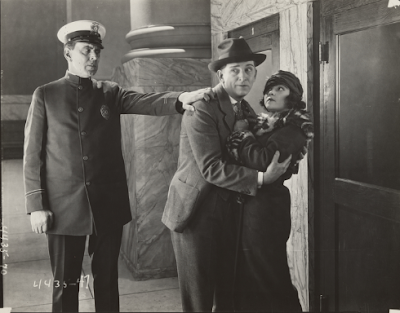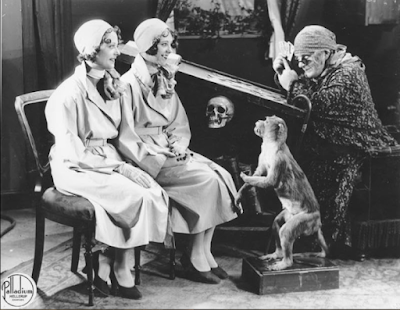We finished off day six climbing every stairway, late after dinner and relegated to the Gods for the spirited but slightly odd Poker Faces (1926) featuring Edward Everett Horton and Laura La Plante in a winning combination of cheeky chappie and Universal’s top star for much of the Twenties who didn’t manage to achieve his career longevity, retiring as a movie star at just 30 in 1935 by which point Horton was pushing 50 and with years of success ahead.
Horton plays Jimmy Whitmore a man whose face gives
nothing away expect, he’s Edward Everett Horton so, of course, there’s a lot of
comic meaning flashing across his face, he’s no Buster Keaton in this regard.
If anything, La Plante as his wife Betty is better at stoneface especially
frustrated by his glacial career advancement – and consequent lack of new rug –
and then stone-cold furious as his big break turns into a farce – a little
forced compared with say Marie Prevost’s Up in Mabel’s Room, but still funny
and with the charm of these two leads.
Jimmy gets offered a promotion so long as he can close a
big new deal with out-of-town big shot George Dixon (George Siegmann) who he
has to meet at the station. By this time Betty has stormed off to get a job of
her own after Jimmy nixes the new carpet and thinking he sees her about to
leave town, wearing a veil with similar luggage (of course) pursues her and
starts to remonstrate. This attracts the attention of Big George who chivalrously
steps in to defend the woman who, veil lifted, turns out to be of Chinese origin
so, of course, she couldn’t be Jimmy’s wife… and our collective cringe went up
a gear as an intertitle of Chinese appeared. That was 1926 that was.
 |
| Edward's way with women. |
Jimmy and George don’t know who the other is though,
despite having unknowingly got off on bad terms Jimmy’s boss Henry Curlew (Tom
Ricketts) invites them to his house for dinner to finalise the deal. He also
invites Jimmy’s wife which is an issue as the latter thinks he’s been deserted
by his inconveniently ambitious spouse and has to hire a woman to act as his
wife (Dorothy Revier). She’s married to Pug (Tom O'Brien) a prize fighter… not
someone you’d want to upset in any way. Can you guess where this is going?
Naturally chaos erupts at Curlew’s house as the men find
out who each other is and the old man’s new secretary is unveiled… it’s Betty
who is probably more surprised about his new “wife” than Jimmy is about her new
job. There follows extended confusion and confrontation as Jimmy tries to
protect the honour of this young woman as George takes a shine to her. It’s
well played by everyone, and the direction is well timed by Harry A. Pollard.
It’s a farce. sometimes you’re in the mood sometimes you’re
not and tonight I was.
The daftness was enlivened considerably by a new score composed and conducted by Juri Dal Dan performed live by Zerorchestra, Pordenone’s finest and who played for this on the tradition GCM eve screening. The band were swingling and tight, turning musical direction on the flip of a dime and with short solos highlighting and reinforcing the comic energy. No wonder the Verdi was packed out to the rafters where we sat!
 |
| Hannes Schneider |
Before our evening exertions we were on top of the world
with Arnold Fanck and his intrepid mountaineering filmmakers for Der Berg
Des Schicksals (Mountain of Destiny) (1924), the film that reputedly
inspired dancer Leni Riefenstahl to get in touch with its pioneering director, Arnold
Fanck, who then featured her in The Holy Mountain. I love Fanck’s films,
the scenery obviously, the sense of actual adventure filming at these altitudes
and the bravery of the leads taking on the actual crags and scrambles.
The “destiny” is for the son to follow the father in
conquering the peak which he tried but failed to climb. Inspired by the fatal
attempt of climber Carlo Garbari to summit the Guglia (“spire”) di Brenta in
the Dolomites, Winter Olympian Hannes Schneider plays Bergsteiger who is
haunted by the peak and his son is Alpine expert Luis Trenker who would star in
other Fanck films and who looks like he was hewn from the granite of these
mountains (was he Married to the Mountains?!).
Fanck would start by shooting footage of dangerous climbs and
incredible landscapes and then evolve his stories later and sometimes there’s
more climbing than character but there’s good support from non-climbers like Erna
Morena as the climbers’ wife and mother as well as Hertha von Walther as Hella
who Trenker has to go to rescue on a stormy night. She climbs well and looked
familiar to me as she’s an uncredited actor in Pabst’s Joyless Street (1925).
Airy accompaniment was provided by Mauro Colombis and the
ubiquitous Frank Bockius who is no doubt familiar with these Germanic hills!
Stunning visuals on screen and hard-hitting, syncopations on stage!
 |
| Harald Madsen charms Marguerite Viby and Nina Kalckar |
The Slapstick programme brought us down to earth with the
existential crises of Pat and Patachon in Højt paa en kvist (High Up
on a Twig) (1929) which featured the following intertitle: “One is tall,
the other is short”, which I though was a very dry joke I’d made about their comedic
proposition at the Kennington Bioscope in 2018… The two madcaps are engulfed a
series of comedic situations during the course of this feature and attempt to
romance two attractive young women, played by Marguerite Viby and Nina Kalckar,
who are clearly such generous souls that they see the inner beauty in both men
although they are under the misapprehension that they’re rich.
The film was apparently a return to form for the couple
who had been working together for over 25 years at this point. Ulrich Ruedel is
very good in the Giornate programme on the reasons for their success and on
just why their comedy was different to the Brits and Hollywood. Clearly both
men, Pat (Harald Madsen) and Patachon (Carl Schenstrøm) were good actors
playing a different style to the gag-based Brits and it’s our challenge to
understand why even if we just don’t laugh as much.
Meg Morley made her GCM42 debut and as usual accompanied
with assured melodic invention and her jazz-practiced improvisations always
have a distinctive quality even as she presents musical themes that are very
much of the period, jazz age in spirit as much as form.
 |
| Mary Harald in the fields |
Vendémiaire (1918), presented as one feature, was essentially
a two parts plus prologue, from the master of the multi-part adventure, Louis
Feuillade and showed a more considered and down-to-earth, director three years
on from Les Vampires and the War. There were some lush landscapes of the
canals and countryside near Lyon and a feature feel to the lengthy episodes as
a plot unfolded about two escaped German POWs infiltrating a group of farm
workers in the Great War.
René Cresté plays Pierre Bertin a soldier on leave to
recover from his mental and physical wounds and he meets a family heading away
from the front line to seek work and to find out what happened to their
siblings. They all end up working on a vineyard in Lunel (Feullade’s hometown)
run by Capitaine de Castelviel (Feuillade regular Édouard Mathé) and where the
two Germans also infiltrate. Wilfred
(Louis Leubas) and Fritz (Manuel Caméré) cause much disruption as they try to
further the fading German cause and frame a gypsy, Sarah (Mary Harald, who also
featured in the director’s Tih Minh (1918) and who was of mixed race
possibly born in Hong Kong or Vietnam) as they rob the Captain… there are fuller
characters than in the director’s more adventure-based serials and, as the
propaganda it undoubtedly was, Vendemiaire stirs your heart as you hope for the
best for these refugees.
Accompaniment for the 143 minute run time was split
between Gabriel Thibaudeau and John Sweeney who both provided the lyricism and
spirit the subject matter demanded; John’s triumphant cadences at the films’
end were especially moving as the certainty of the victory at the time of
release was clearly less and we now know that the new peace was only to last
barely twenty-odd years.
There were also some extra special entrees before Poker
Faces accompanied by maestro Stephen Horne and including some wonderful colour
shots around Niagara Falls in, er, Wonderful Water (1922) and Max Roach
comedy, A Truthful Liar (1924) featuring Will Rogers as Alfalfa
Doolittle who becomes Ambassador to Cornucopia where he dispenses with formalities
and gets matey with the King (Richard Pennell) who would much rather go to an
American bar in the city than spend time with his suffocating court. Alfalfa
duly uses his cowboy powers to rescue the King from runaway horses and would be
assassins. It spoofs the whole Ruritanian idea and features the immortal
couplet:
Roses are red,
Violets are blue,
I’m against royalty,
How about you?
There were also some poignant footage of the man Chaplin
called The Master, Max Linder in 1924, still so full of charm and intelligence
and yet struggling with mental health issues after the war that would lead to
his death the following year. Enjoy yourself, it’s later than you think…
 |
| René Cresté and Gaston Michel Vendémiaire (1918) |
*See Le Giornate del Cinema Muto 42, Day Four



+colour.png)









No comments:
Post a Comment